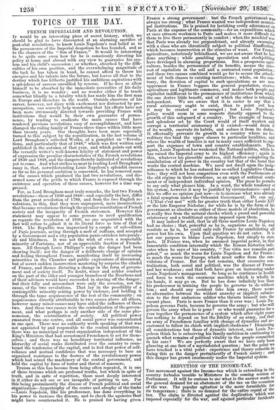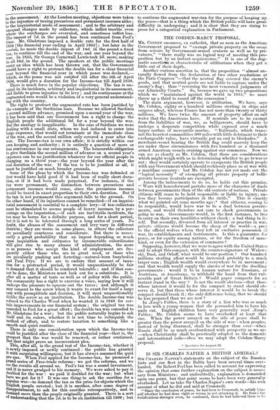liEDUCTION OF THE INCOME-TAX".
THE movement against the Income-tax which is extending in the country forbodeS trouble to Miniaterd in the coming session of Parliament. It will be curious to see what is the answer made to the general demand for an abatement of the tax on the cessation of the war. The popular agitation is the mote forraidable for its temperance ; there is no demand. for the entire repdid of the tax. The olefin is directed against the duplication which was imposed especially for the War, and against pattieultir- incidents in the assessment. At. the London meeting, objections were taken - to the injustice of taxing precarious and permanent incomes alike ; to tho inquisitorial mode of assessment; and to the arbitrary and unequal charges made by collectors, which inflict trouble even where the surcharges are- overruled, and sometimes inflict loss. , The impost of 7d in the pound has been continued from Peers time. Mr. Gladstone imposed a double rate for the first half of 1854 [the financial year ending in April 1855]; but later in the seesion,he made the double impost of 14d. in the pound a fixed tax to continue till the end of the war, and one year beyond the war. In 1856, Sir George Cornewall Lewis took 2d. more; making in, all Hid.. in the pound.. The speakers at the public meetings resist an idea which has been thrown out, that the Government iniuld- have a right to protract the double tax for a clear financial year beyond the financial year in which peace was deelared,-- which, as the peace was not ratalied till after the 5th of April 1866, would give a duration for the Income-tax till April 1858. There is much force in the popular objections. The tax is un- equal in its incidents, arbitrary and inquisitorial in its assessment, and liable to gross injustice in its levy ; and its continuance at the augmented rate would be a violation of a very general understand- ing with the country. The right to protract the augmented rate has been justified by the example of the Sardinian loan. Because we allowed Sardinia a second million advance, promised upon a second year of the war, it has been said that our Government has a right to charge' the English people the additional 9d. for a year beyond the war. But the analogy is inapplicable. In the case of Sardinia we were dealing with a small state, whom we had induced to enter into large expenses, that would not terminate at the immediate close of the war, and the second million only covered a year after the war. The Income-tax is our own. affair; it is strictly within, our own keeping and authority ; it is entirely a question of more or less convenience in our arrangements. The honourable obligation to give Sardinia.the second million of advance on a second year's expenses can be no justification -whatever for our official people in ing us a third year—the year beyond the year after the
real duration of the war. If the tax_ is to be justified at all, it must be justified_ on much broader grounds.
Some of the pleas by which the Income-tax was defended_ at first would have held good if it had been of really short dura- tion, or if it had been. made perpetual. For instance,. if the tar were permanent, the distinction between precarious and permanent -incomes would cease, since the precarious incomes would be taxed in exact proportion to their own duration. But if the tax is not permanent this, argument falls to the ground. On the other hand, if its injustices cannot be remedied—if an inquisi- torial assessment is essential to a complete levy—if tax-collectors must be stimulated to accuse people of heavy incomes, by a per- centage on the imputation,—if such are inevitable incidents, the tax may be borne for a definite purpose, and for a short period,. but it is not to be tolerated through a long series .of years. No . doubt, the abuses of the assessment and levy vary in different districts.; they are worse in some places, in. others the collectors are peculiarly courteous and considerate. But there is neces- sarily a great probability that an impost depending so much upon inquisition and estimates by innumerable subordinates will_ give rise to many abuses of administration, the more so as persons who accept the kind, of employment are fre- quently either those who are in great need, or these who are peculiarly pushing and. ferreting—natural-born busybodies and Paul Prys. If we are to endure that amount of taxa- tion for. a protracted period, it would unquestionably be fair to demand that it should be rendered tolerable ; and if that can- not be done, the Ministers must look out for a substitute. It is, after all a matter of taste as well as of policy with the public. The community has a right to exercise a voice, saying how it will undergo the pressure to squeeze out the taxes ; and although it may consent to the screw when it wants to exact:for itself a large sum with promptitude and decision, it will most unquestionably dislike the screw as an institution. The double Income-tax was refused to Sir Charles Wood when he wanted it in 1848 for cer- tain improvements in our financial system ; the original tax was conceded to Peel for a great effort ; the double tax was conceded to Mr. Gladstone for a war ; but the public naturally begins to ask itself and its rulers, whether it is not time to relinquish the method of effort, and to restore -taxation to something like a smooth and quiet routine.
There is only one consideration upon which the Income-tax could be justified after the close of the financial year—that is the prospect that the war would be renewed, or rather continued. But that might prove an inconvenient plea.
This, after all, is the grand test of the Income-tax, whether it ia newly imposed, or newly continued : the public has granted it with surprising willingness' but it has always assumed the quid. Pre rly.o. When Peel applied for the Income-tax, he promised a grand series of Free-trade reforms : we got the reforms, and we see the results all around us. Peel's tax was a sound investment, and it is never grudged to his memory. We were asked to pay it doubled for the war : we paid it doubled for the war; but what have we got for it ? It was one thing to ask the saerifiae for a Popular war—to demand the tax as the-price for objects winch the Eng,. EA people coveted ; but it is another, after some degree of Qusappointanent, to ask for this sacrifice retrospectively, and. to. demand more than the people originally granted. There is a. sort of understanding that the 7d. is to be an institution till 1860 ; but • to continue the augmented war-tax for the purpose of keeping Up . the peace—that is a thing which the British public will have. great difficulty in undergoing ; and it is clear that they are rising to press for a categorical explanation in Parliament.



























 Previous page
Previous page